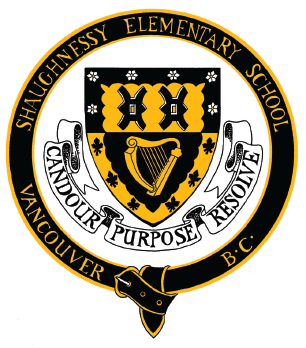Code of Conduct
Code of Conduct - Updated June 2024
ACT RESPECTFULLY
ACT RESPONSIBLY
ACT SAFELY
Mission Statement
The Shaughnessy School community is committed to providing a safe, respectful, learning environment where students are challenged academically and are encouraged to be responsible learners and productive citizens.
School Code of Conduct ~Act Respectfully, Act Responsibly, Act Safely.
We have clear and simple expectations for behaviour at Shaughnessy. Everyone who is part of the Shaughnessy school community is expected to act in accordance with the Code of Conduct. We actively teach programs about personal safety and problem solving. Students are taught to use ‘Second Step’ language on the playground and to understand that getting an adult’s help for problem solving is not ‘telling on someone’, it is helping to solve a conflict and also helping someone else learn an important lesson about being respectful, responsible and safe.
Students are expected to demonstrate and develop respect for themselves and others, show and take responsibility for their actions to benefit their classroom and school community, and always act safely. We prefer to call on common sense rather than formalize a long list of do's and don'ts although there are specific School and Classroom Rules which are developed and reviewed annually in classrooms and in the school. At Shaughnessy we reflect upon our choices, take responsibility for our actions, and make amends through a restorative action plan with consideration of the developmental levels, age, maturity and special needs of students, if any.
If you are concerned about an incident your child tells you about, please let the teacher, support staff or principal know so we can get the full story, find the appropriate resolution and learn from the experience. The school will treat seriously behaviour or communication that discriminates based on race, colour, ancestry, place of origin, religion, marital status, family status, physical or mental disability, sex or sexual orientation (prohibited grounds set out in the BC Human Rights Code).The school will take all reasonable steps to prevent retaliation against a student who has made a complaint of a breach of the Code of Conduct.
Consequences for Excellence
Students are recognized for kind and generous acts around the school through Social Responsibility assemblies, by Staff members, Peer Helpers and Supervision Aides. Students also have the opportunity to participate in a number of community building activities including Peer Helpers, School Monitors (Library, Office, Lunchroom), Safety Patrol, and fundraising events (Terry Fox, Canuck Place, Food Bank).
Consequences for Misbehaviour & Parent Notification
Consequences for misbehaviour are considered in three stages with the overall goal of improved student learning and behaviour.
- First, for minor misbehaviours, staff will ask the student to identify the inappropriate behaviour, to explain and make a better choice including apologies, restitution and brief ‘time-outs’. These are ‘reminder’ situations and parents are often but not always notified at this stage.
- Examples: running or jumping inside; rough, unwanted ‘hands-on’ play; not listening to staff requests or instructions, talking back, littering, disrupting learning for others
- Second, for more serious situationsor for repeated difficulties, staff will make a record of the incident and set in-school consequences such as restitution through community service, loss of appropriate privileges, or problem solving meetings with the Counselor, Principal or Vice-Principal. Parents are regularly contacted at this stage.
- Examples: using disrespectful language such as swearing, name-calling, teasing; using communications technology to insult or be disrespectful to others, vandalism, stealing
- Third, for serious infractions, more formal and logical consequences will be used including meetings with parents and school staff, formal and informal loss of school privileges or suspensions according to the provisions of the School Act and Vancouver Board of Education Policy.
- Examples: dangerous or very unsafe behaviour likely to cause physical harm to self or others; bringing dangerous items to school (weapons, lighters etc); vandalism, fighting, showing willful disrespect or non-compliance, using racist, sexist or other derogatory language.
- It is important for parents to note that in the case of a serious breach of the Code of Conduct, it may be necessary to inform school district officials, the Vancouver Police or Ministry of Children and Family Development.
Examples of Respectful, Responsible & Safe Behaviour
Acting Respectfully means:
- treating others the way you would like to be treated
- listening carefully and responding appropriately when asked
- speaking politely to others
- solving problems in peaceful ways
- recognizing that all staff members are supervisors
Acting Responsibly means:
- being on time for school and ready to learn
- helping yourself and others to learn by following classroom expectations
- speaking truthfully and accepting consequences
- using recycling and garbage containers
- following appropriate dress code expectations
Acting Safely means:
- thinking before acting
- walking inside
- leaving dangerous or valuable items at home
- no toy guns or weapons at school
- enjoying ‘hands-off’ play
- riding bikes, boards or blades after school hours (3:30 pm)
- climbing on the adventure playgrounds not on other objects
Supervision
Staff members supervise students on the grounds before and after school and Supervision Aides supervise at recess and lunch time. Supervision Aides are there to ensure student safety and to encourage students to remember the Code of Conduct and Second Step procedures for solving problems in peaceful ways. Supervision begins at 8:40 am and ends at 3:15 pm daily. Parents are responsible for supervision outside of these times and on non-instructional days.
Parent Support
Parents have a major part in supporting the school’s Code of Conduct by:
- talking with your child about their school experiences
- informing the teacher or the principal if you have any concerns or questions
- ensuring your child comes to school well rested and on time
- checking your child’s agenda and homework
- using Code of Conduct language and expectations at home in relations with siblings and peers
- enabling independence and responsibility through accountability
- modeling good citizenship (especially when driving children to school)

